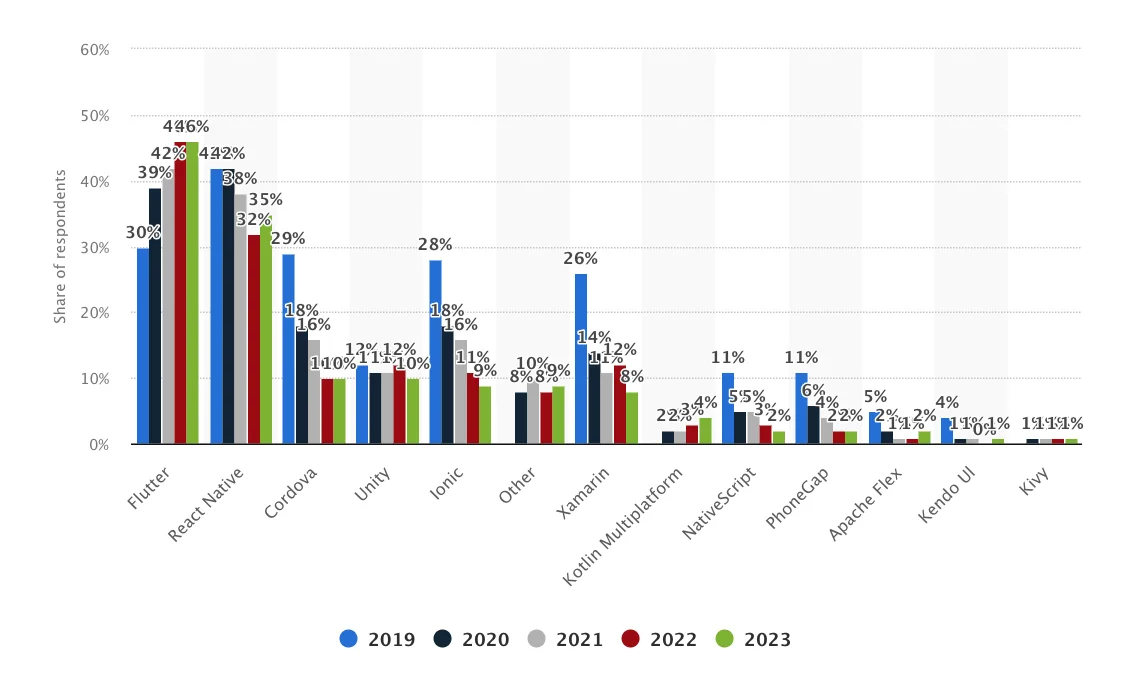React Native Databases: Which One to Choose For Your App?
- Mobile
- September 16, 2023
Choosing the best database for a React Native app is one of the crucial decisions a development team has to make. It has a substantial impact on user experience, improving performance, user personalization, and more. This blog provides you with a list of the best local and server-side databases, along with factors to consider when choosing among these React Native databases.
React native has emerged itself as a major preference of establishments and startups seeking a mode for entering the app domain cost-effectively and time-efficiently. It is one of the most famous cross-platform mobile frameworks used by developers worldwide. As per a 2023 developer survey, 35% of software developers utilized React Native.

A React Native Developer is under extreme pressure for delivering a high-performing, offline-first app that can be scaled anytime. Hence, sometimes it becomes difficult for developers to opt for the relevant technology stack incorporating the right database for React Native.
In this blog, I have compiled a list of databases for react native app development. They might match your needs like scaling easily with your user base or supporting offline development capacities.
However, before discussing the best local databases for react native app development, let’s highlight the factors you should consider!
Factors to Consider While Choosing a Database for React Native App Development
Here are some aspects to take note of while choosing the best database for React Native app:
Memory Handling
If data is not handled properly, apps may get crashed more. Albeit maximum databases usually clear their cache in time intervals which makes sure that sufficient memory is accessible for running an app properly.
Complexity of Data
It is assessed that for maximum applications, data is preserved either in the form of key values or a JSON structure. This makes it essential to select a database that can manage complicated data structures like full documents or objects.
Managing Data Conflicts
If you add more cooperation related features inside the app, you may experience more data conflicts. You must seek React Native databases that share the conflict management rules on the repository pages or website.
Delve into the database documents to beware of the ways they manage syncing and conflicts or explore the trade-offs that are created and the impact it would create on the app.
Syncing Data Offline
Presently, users need their apps to work in offline mode also or when their internet connectivity is slow. Thereby, it is important to integrate the database that allows data synchronization when users have connected again to the internet.
Concurrency
When an application becomes popular, developers’ responsibilities increase and they need to manage a massive amount of data. Many requests will come from users and it’s very difficult to provide precise data to them.
Hence, it’s extremely essential to learn about the concurrency method applied by various React Native local databases.
Ease of Use
You should always select a React Native database that can be combined with fewer efforts. This will help you improve the development procedure and simplify the developers’ job.
Types of Databases for React Native App Development
Developing a React Native app involves crucial decisions about database management. Choosing the right database is crucial for creating responsive, feature-rich applications that meet both user expectations and business needs. Here are the types of databases commonly used for React Native applications:
- Local Database
- Server-Side Database
Let us explore some of the best React Native databases for local or server-side data management.
Best Local Databases for React Native App Development
Building a seamless and engaging React Native app often hinges on smart data management. Local databases play a crucial role in this by offering functionalities that enhance user experience and app performance. Here are some of the best local databases for React Native applications:
1. Realm

The Realm is an object-oriented and open-source database that operates 10 times quicker than that of the relational database. Moreover, it supports complicated data types for real-time and offline apps. It doesn’t need any key-value stores or object-related mapping and it has its own search engine. The objects preserved in the Realm database are allowed for accessing many sources or threads.
Developers opt for Realm database to improve the performance of a React Native application by dealing with vast data. Being a high-performing database, Realm has proven to fix the queries better compared to SQLite and other databases. All in all, this database is favorable and the best choice for large-sized apps.
Although the Realm is an open-source platform, its advanced version will cost you $1750 every month. Its pro version features Realm Studio and some other great features for enterprises.
Benefits of Realm
- Its synchronization keeps running in the background for saving user interaction.
- It features a great set of APIs.
- It utilizes various encryption standards for every mobile platform.
- Realm is offline-friendly with Redux offline.
2. Firebase

Firebase is a Google-owned database having NoSQL. If your application is more into offline data updating and data synchronization, Firebase will suit you best. Firebase can significantly manage MVC-based React Native apps that have high data requirements.
Moreover, Firebase features performance tracking tools that will help you assess a bug in your application. It gives you full access to data removal from the Google server whenever required.
The assessment procedure done by Firebase is ISO 27001 and SOC1, SOC2, and SOC3. This database is free for using up to 1GB and then you have to pay $25 for storing almost 2.5GB of data.
Benefits of Firebase
- It can address users’ roles that will help you fix controls on file.
- You can combine Firebase with any app easily.
- It caches the data on devices to offer offline access to users.
- It helps synchronize the data throughout different platforms.
Read also: The Benefits of Having Firebase for Mobile App Development
3. SQLite

This was originally built to offer users the capacity of making local storage databases for mobile apps. In the name, ‘Lite’ stands for the database’s lightweight, which needs a minimal setup. It executes maximum SQL policies with extra tools that help you manage the data easily.
Although its performance quality is debatable, greater results can be accomplished for people who have encountered amazing database development. SQLite source code is free for everybody to utilize for any reason and it is in the public domain.
Benefits of SQLite
- It saves data in the cross-platform database file.
- You can allow the offline persistence in an app using its storage.
- It is ACID compliant; hence, executes nearly all SQL standards.
4. PouchDB

This is an open-source JavaScript database. It preserves data in JSON format and enables all CRUD (Create, Read, Update, Delete) functions to be queried and mutated using a simple JS API.
PouchDB allows apps to store data locally even while offline and then sync it with compatible servers and CouchDB when the app is again online, keeping all user data synchronized regardless of where they log in next. As a dependency, PouchDB is lightweight.
It helps secure data easily for a React Native app. It has an in-built authentication system for React Native and it provides features like password storing in the harsh form with the PBKDF2 crypto algorithm for protecting encrypted keys from degraded attacks.
Benefits of PouchDB
- It helps sync data with any supported server.
- PouchDB is made with CouchDB protocols and supports both offline and online capacities.
- It supports SSL, which implies that you can encrypt data easily with AES256.
- It helps replicate data like a pro.
5. Async Storage
It’s a local storage framework that enables developers to store data locally and retrieve it between reboots of an application. This database features React Native in-built; hence, you can use it without anymore deployment.
Even after you have closed the device or app, Async Storage comes in handy when you need to save the data the app has to use.
Benefits of Async Storage
- It is accessible whenever required.
- It is in-built with React Native.
6. Couchbase Lite

This is a NoSQL JSON document database used by developers as a standalone embedded DB accessed through iOS and Android native APIs. It’s designed for developing mobile and IoT apps.
Best for React Native app development, it excels in creating offline-capable, cross-platform apps with robust data storage and synchronization capabilities.
Benefits of Couchbase Lite
- Availability of the data even without network connections
- Multiplatform support across iOS, Android, and Windows
- Peer-to-peer sync support
- Efficient data management and querying
7. Watermelon DB

This is built with the purpose to optimize the React Native database. It is developed on top of SQLite and provides excellent performance to React Native Database. Watermelon DB can scale thousands of records within a minute.
As per Github’s official statement, it is optimized for creating tricky apps that concentrate on real-world performance.
By being lazy, it manages data persistence with slow end devices. And as an outcome, you cannot load any request if it is not requested in the first place. Moreover, it can handle highly cached and multithreaded async functions.
Benefits of WatermelonDB
- Static typing with flow
- Offline-first system by synchronizing your engine
- Simple data plugging into components
- When changes are created in the database, UI will be rendered again automatically.
8. Vasern

Vasern is one of the most lightweight, open-source, and fast React Native databases. The Vasern API is utilized not only for local data storage but also for syncing and cloud storage across the app users. Its structures and design got inspiration from different open-source databases.
Benefits of Vasern
- It operates fast.
- It features developer-friendly end-to-end database synchronization.
- Vasern is an open-source database.
- It concentrates on app performance and consistency.
Best Server-side Databases for React Native App
Having a server-side database provides the backbone for data storage, management, and retrieval in your React Native app. Here are some server-side databases you can consider for your React Native development needs:
1. MySQL
It’s an open-source relational database management system (RDBMS) known for its reliability, robustness, and ease of use, making it a popular choice for both small and large-scale applications. This server-side database is developed, distributed, and supported by Oracle Corporation.
It makes it easier for your team to manage data, especially if your application is dealing with structured data. It features cloud integration, optimization for high-speed transactions, robust security, the ability to handle large data sets, and more.
Benefits of MySQL
- Provides cross-platform compatibility
- Reduces the overhead of database maintenance and management
- Supports both vertical and horizontal scaling
- Ensures data integrity and reliability
2. MongoDB
Unlike the aforementioned server-side databases, if your React Native app deals with unstructured or semi-structured data, MongoDB, a document-oriented NoSQL database, is ideal and best suited. MongoDB offers a flexible and scalable approach to data storage by using the JSON-like BSON (Binary JSON) format.
This database features document-based data storage, efficient query indexing, and more. It is suitable for real-time apps, eCommerce platforms, CMS, and more.
Benefits of MongoDB
- Horizontal scalability
- High throughput
- Automatic failover and redundancy
- Seamless integration with JavaScript-based frameworks
- Cross-platform deployment capabilities
3. AWS DynamoDB
Provided by Amazon Web Services (AWS), DynamoDB is a NoSQL (Key-Value) database designed for large-scale, high-traffic applications that demand low-latency data access. As a fully managed database service, DynamoDB allows your team to focus on application development without the burden of managing database tasks.
DynamoDB features include low-latency access, a flexible schema design, seamless integration with AWS Identity and Access Management (IAM), and more. It is particularly well-suited for modern applications requiring reliable and responsive data management capabilities.
Benefits of AWS DynamoDB
- Seamless integration with the AWS ecosystem
- Supports real-time data updates
- Minimizes server management overhead
- Offers offline-first capabilities
4. PostgreSQL
PostgreSQL is a powerful open-source relational database management system (RDBMS) that stands out as a preferred choice for building scalable and secure server-side applications in React Native due to its versatility and robust SQL compliance. It utilizes the SQL language for data manipulation and offers extensive features.
PostgreSQL features a relational database model and is highly extensible and customizable. It excels in various applications, including data-driven apps, analytics and reporting, content management systems (CMS), and more.
Benefits of PostgreSQL
- Supports structured data management
- Provides cross-platform support
- Follows ANSI SQL standards
- Supports both asynchronous and synchronous replication
- Offers performance optimization
Concluding Thoughts
When you are seeking the best database for React Native, you should first make a list of your requirements. You should not compromise a single requirement while selecting such a database. Your app’s success may rely on the database that you choose for your app.
You can hire an expert React Native app developer to help you select a suitable database for your React Native application. If you have more queries in your mind regarding this, contact an expert development team right away!
FAQs About React Native Databases
The choice of the best database for React Native is dependent on several factors like complexity of the data, memory management, offline data synchronization, number of data, etc.
There are many local databases for React Native like Realm, Firebase, SQLite, PouchDB, Async Storage, WatermelonDB, Vasern, etc.













